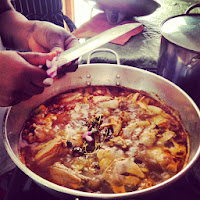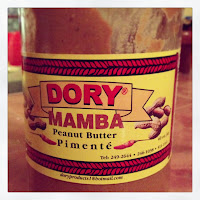When you move to another country, you sign up for many new
things from climate & currency to language & diet. The first thing that
people often associate with Haitian food is rice and beans- which is absolutely
correct!
Food is a huge & interesting aspect of a country’s culture. In the United States, there is such diversity
& variety. In one week, we can
easily travel the globe just through the food on our plates, Chinese, Italian,
Mexican, Thai and so many more. If I’ve
had Italian food one night and it’s suggested a couple days later, I’ll often
think, “I just had that.” So
spoiled! The thing about being in
another country is that you eat a specific kind of food every day. I know it seems obvious, but it’s just
different and takes some getting used to.
The day-to-day menu and routine revolves around a certain
rotation of specific local ingredients, inexpensive staples, spices and a
variety of meats.
Food is something we take for granted so easily in the
U.S. It’s always available and nearly
everywhere we turn, we see a grocery store, coffee shop or restaurant. It’s
also more than just sustenance & a source of energy. Food brings people together to celebrate,
socialize and entertain. We care for people
by preparing & lovingly serving food to welcome them into our home. We watch TV shows about food, research the
new places in town to indulge in something different and spend a lot of time
& energy planning our days around our next meal, snack or treat. So much of
life revolves around food. Don’t get me wrong. I love food. I’m thankful for
it, love to prepare it, share it and talk about it. Let’s be real; I take
dozens of pictures of food.
However, being in Haiti has caused me to step back and
rethink a few things about how I view what I eat.
In Haiti, the plan is for the day. What will we buy, cook & eat today. That’s all.
Electricity is a luxury and refrigeration almost non-existent. Many streets are lined with vendors selling
rice, fruits, vegetables, meat, beans, eggs, oil and spices. Simply getting the food needed for the day can
be a struggle. Many go without. I saw a
baby boy in an orphanage hanging onto life due to malnutrition. He was just
skin & bones, which I think would cause anyone to ask a few questions about
the extravagant abundance experienced by so many and then this little guy nearly dying due to not having anything. Praise God he is in a safe place receiving the care he needs! I cannot imagine what a parent must experience to lack the resources to care for their own children.
Where we live at the guesthouse is an exception as we have
the privilege of having a generator to power a refrigerator, but it’s
definitely the exception.
I’m not exactly sure how to really rethink or make changes
in how I view food because these questions are still very much QUESTIONS in my
mind.
Even here, I’ve taken a lot of food pictures already. Tim doesn’t quite understand this quirk of
mine, but he goes with it.
What I’ve learned so far about Haitian food:
- White rice is eaten almost every day.
- Haitians eat 2 meals a day- one in the morning & one at about 4:00. Part of the 2nd meal might be saved for later in the evening. Both meals are similar- rice, meat, beans, Haitian Spaghetti, pictured below. (includes spaghetti, hot dogs, mayo & ketchup)..not cereal & toast. ;)
 |
| my first 7 am BBQ chicken experience |
- There are a few basic carbs eaten every day- rice, mayi moulen (corn porridge, see below), spaghetti, & millet.
- Meat is a small part of a meal and often in a red sauce.
- Beans are also included in most meals either with rice or as a bean sauce.
- Food preparation is a time-intensive process from shopping, transporting, cleaning, pealing, chopping and cooking. It can often take all day to prepare one meal.
- Shopping at a market is not a walk in the park. Hot & crowded!
- Food doesn’t come from a package or box. Its all prepared from scratch.
- Plantain chips, bought off the street, are super tasty. They are about $0.25 a bag.
- Peanut butter is spicy.
- Hot sauce is put on everything. (Too hot for me!)
- There are a number of stores where American brands can be purchased, but they come with quite a price tag.
 |
| $87! |
 |
| Juice on sale for $7.50 USD |
 |
| $40 for these 7 things |
- The best fresh fruits & juices! Grenadia juice is my favorite. (passion fruit)
So there you have it...Haitian food 101!



















LOVE this Aimee! You are a very good writer and photographer. I have been wondering how WE will adapt to the new food experiences when we get to AFRICA... You are in our prayers, and we SO love to follow your journey ! We hope to have similar stories to share in just a few months.
ReplyDelete